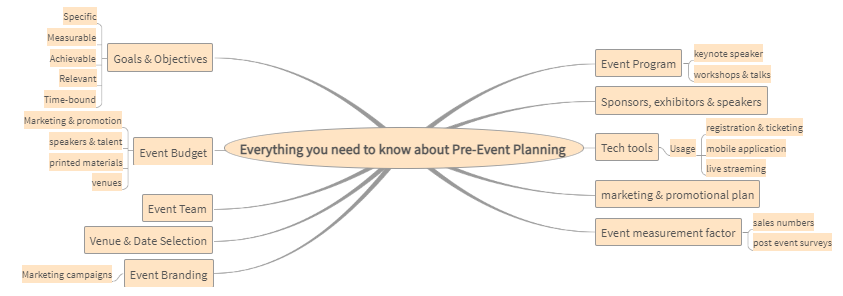As the foundation of your event concept, pre-event planning is probably one of the most crucial stages. Everything you do or don’t do at this early point will impact the execution and attendee experience on the day.
Therefore, meticulous planning is essential to ensuring everything goes like clockwork from start to finish and that people turn up and enjoy themselves.
Some basic steps that you need to consider for the planning:
- Goals and Objectives
- Before you begin crafting your specific goals and objectives, spend some time considering your purpose.
- Event goals are where you start to get more specific. The best goals support your purpose.
- Finally, your objectives create the roadmap to achieving your goals. Objectives are more specific than goals, and they should be written in detail to define the narrow, measurable, and tangible results you hope your event will produce.
Event objectives should be: S.M.A.R.T
S – Specific: What outcome are you aiming for? What’s the deadline?
M – Measurable: You should measure your objectives with numerical data whenever possible.
A – Achievable: You want to create objectives that are within reach. Be realistic.
R – Relevant: The objective should relate to your company’s goals. If it doesn’t, it’s not worth pursuing.
T – Time-bound: Objectives should be time-bound, meaning they have a defined start and end date so you can measure whether you met your goal during the allotted time.
- Event budget
Creating a budget is an essential early step in event planning that helps to clarify other aspects of your plan. You will be more successful if you map out your entire budget in advance, continue to update as you finalize variables, and stay very close to the process.
According to Eventbrite, “Budget is broken down by marketing and promotion (43%), speakers and talent (32%), printed materials (29%), venues (18%).”
As your plan solidifies, you’ll have to revisit the budget. Line items will undoubtedly change; just remember to keep an accurate budget that reflects any changes or updates you make, too. And because you never want to exceed your budget, it’s common for planners to make adjustments to ensure you are maintaining your budget.
- Event team
In more modern terms, we might say that “teamwork makes the dream work.”
A great team makes all the difference and this is especially true when planning an event. It’s almost impossible for a single person to pull off an event on their own. You need a team you can trust.
- Select Venue and Date
Choosing your venue and date for your event are two major considerations that will shape the rest of your project plan. Start researching venues as early as possible. The event marketplace is crowded, so finding the time when there will be venue availability is important. When deciding on a venue, you’ll also have to consider dates for your location based on seasonal factors like travel and costs.
- Event Branding
Event branding captures the essence of your organization’s brand and gives it its proper due in your event marketing campaigns.
This can be done through digital branding (event websites, event apps, event email marketing) and onsite branding (event booth, swag, cupcakes).
From the event name and theme to the event website design and on-site look and feel – your event’s branding sets the tone for your event. When people think of your event, you want a strong personality to shine.
Additionally, a strong event brand provides a vision and helps to steer the direction of your event.
- Event program
Set your agenda as early as possible! Is there a keynote speaker? Will there be an extra day or evening planned just for your sponsors? Will, there be a single “track” of workshops and talks, or will attendees have the choice to choose between multiple sessions at a given time? As you answer these preliminary questions, you can begin to build a high-level view of your event program.
Your attendees will want to know what to expect, so it is best if you have the basic framework confirmed as early as possible. Additionally, the schedule is an important selling point for sponsors as well!
- Sponsors, Exhibitors, and Speakers
Make sure you are sure about the speakers and they are all ready and get the confirmations of them by making them sign a contract. Invite them personally and have an open line of communication.
Additionally, before reaching out to potential sponsors, take the time to create sponsorship packages. Your packages should offer varying levels of cost and benefit. In addition to standard sponsor packages, don’t be afraid to get creative and offer unique sponsorships like:
Another common way to bring in sponsors is with an exhibitor package. With this, you’ll typically have space at your event dedicated to your exhibitors. Each exhibitor sponsorship agreement comes with a specific amount of allotted space for your exhibitors to occupy, brand, and engage with your attendees.
- Tech tools
Technology is improving the event space for both organizers and event-goers. When mapping out your next event, you will want to identify your technology needs and implementation timelines.
Technology tools can be used for:
- Marketing and Promotional plan
How are you going to attract audiences to attend your well-planned event?
Every successful event has a marketing and promotion plan to spread the word and drum up excitement.
There are many different ways to go about marketing your event. Here are a few ways:
While creating your content for promotion, mention:
Remember, it’s about THEM and not about YOU!
- Event Measurement factor
How will you measure the success of your event?
You should have multiple methods in mind well before the event’s planning phase even begins.
Some of the ways are:
Conclusion
Each of these elements comes together for your event master plan. Work through each of these to create a strong, actionable plan for your event. When planning an event, you should begin your planning as early as possible. With many moving pieces, getting a head start means a smooth finish.
With a strong plan in place and the wheels in motion – the next step is to flush out your marketing plan and put it into action.
Get free access to our fully searchable webinar Compendium.
To learn more on:
For your Virtual, In-Person, and Hybrid Events.
Click here to get free access.






